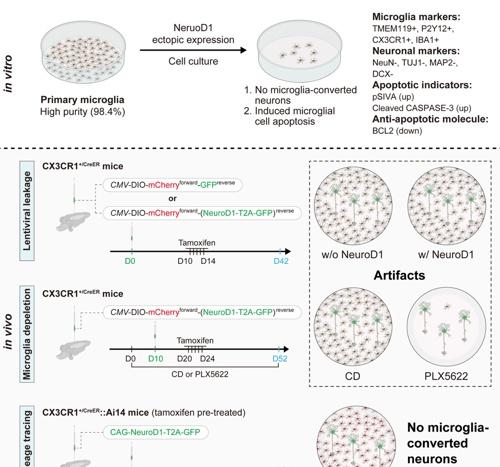Recently, Peng Bo of the Institute of Brain Science Transformation of Fudan University, Mao Ying of Huashan Hospital Affiliated to Fudan University, and Yuan Difei of Shanghai Mental Health Center collaborated to systematically explore the phenomenon of NeuroD1-mediated microglia-neuron reprogramming by using multiple means such as live cell imaging, rigorous lineage tracing and pharmacology. On December 6, the research results were published in Neuron, a top journal of neuroscience, under the title of "NeuroD1 causes microglia apoptosis and does not induce microglia-neuron cross-lineage reprogramming.".

Our brains are mainly made up of neurons and glial cells, both of which are about 1:1 in number. Neurons perform the functions of transmission and integration of neural signals, and glial cells play an important supporting and trophic role. Unlike peripheral tissues and organs, neurons in the mammalian brain in adulthood are almost impossible to regenerate. In neurodegenerative lesions such as Alzheimer's disease, Parkinson's disease, Huntington's disease, and stroke, dead neurons cannot regenerate, causing irreversible severe brain function damage. Glial cells, on the other hand, have a certain regenerative capacity. The researchers therefore proposed to induce glial cells to reprogram and differentiate into neurons by manipulating a single gene, thereby achieving endogenous nerve regeneration, thereby treating neurodegenerative lesions.
Microglia are the most regenerative glial cells in the brain. A previous study by Peng Bo's research group at Fudan University found that microglia can regenerate rapidly at an average rate of 20% per day. To induce microglia to reprogram is to discover an endless source of supplies that can be used to replenish damaged neurons in large quantities. A Japanese research team reported in 2019 that NeuroD1 can induce microglia to reprogram into neurons, but due to the limitations of research techniques, the field is full of controversy about whether this phenomenon is real. In addition, there is also a major controversy in the academic community about other types of glial cell-neuron reprogramming.
To this end, Peng Bo, Mao Ying, and Yuan Tifei jointly proposed three basic principles for rigorous verification of endogenous neurogenesis therapy: rigorous genealogy tracing to prove its origin; explicit live/live cell imaging to observe the glial cell-neuron transformation process; and removal of this type of glial cell for reverse verification. On this basis, the research team systematically explored the phenomenon of microglia-neuron reprogramming mediated by NeuroD1 by means of live-cell imaging, rigorous lineage tracing and pharmacology. They found that the NeuroD1-mediated reprogramming of microglia-neurons reported by the Japanese team was not a real phenomenon, but an illusion caused by the imprecise design of the experiment, thus realizing the de-falsification of endogenous nerve regeneration.
At the same time, Peng Bo's research group of Fudan University used the regenerative ability of microglia to develop three protocols (Mr BMT, Mr PB and Mr MT), which for the first time realized the efficient exogenous transplantation/replacement of microglia at the whole brain scale. This regimen can be used to treat diseases caused by microglia mutations.
One of the challenges of cell transplantation is how to prevent exogenous cells from getting out of control. Based on the fact that NeuroD1 can induce apoptosis in microglia, the research team proposed to put elements that induce the expression of NeuroD1 in transplanted/replaced microglia by in vitro modification. Once the transplanted/replaced microglia are out of control, microglia can be induced to apoptosis by switching this molecule, thereby improving the safety of microglia replacement/transplantation.
Dr. Rao Yanxia of Shanghai Mental Health Center is the first author and co-corresponding author of the paper. Professor Peng Bo of the Institute of Brain Science Transformation of Fudan University, Professor Mao Ying of Huashan Hospital Affiliated to Fudan University, and Professor Yuan Difei of Shanghai Mental Health Center are the co-corresponding authors of this article. The team contributed to this research with a number of people.
Sources
People's Daily client
Text
Jiang Hongbing
Editor-in-charge
Wang Zhenyi